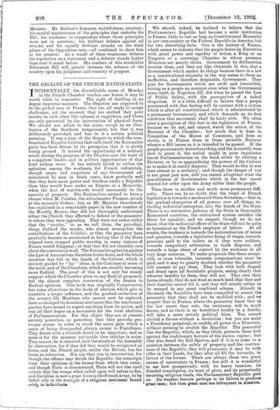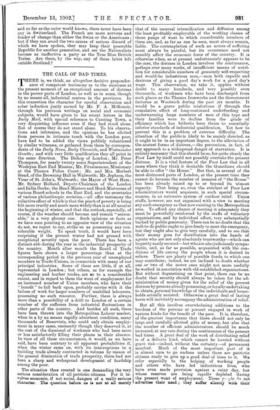THE DECLINE OF THE FRENCH NATIONALISTS.
TNCIDENTALLY, the discreditable scene of Monday in the French Chamber teaches one lesson it may be worth while to remember. The right of duelling in no degree improves manners. The Deputies are supposed to be the picked men of France, they are all ready to accept challenges, yet the moment they are excited they pour insults on each other like cabmen or ragpickers, and blows are only prevented by the intervention of physical force. We should not allude to the scene, except as an illus- tration of the Southern temperament, but that it was deliberately provoked, and has in it a certain political meaning. It was a sign of the despair to which the com- bination of Royalist factions that calls itself the Nationalist party has been driven by its perception that it is slowly losing ground. It missed the opportunity of a military revolt during the progress of the Dreyfus case for want of a competent leader, and in politics opportunities of that kind seldom recur. It has entirely failed to utilise the agitation among the workmen, for French industrials, though angry and suspicious of any Government ad- ministered by men in black coats, know perfectly well that they have more power and freedom under a Republic than they would have under an Empire or a Monarchy, when the first of watchwords would necessarily be the sanctity of property. The Nationalists seemed to have a chance when M. Combes, the schoolmaster Premier, struck at the monastic Orders ; but, as Mr. Maurice Gerothwohl has explained in a remarkable paper in the new number of the Monthly Review, they did not thoroughly understand either the Church they affected to defend or the peasantry to whom they were appealing. They were not aware either that the "secular," or, as we call them, the parochial, clergy disliked the monks, who almost monopolise the contributions of the faithful ; or that the peasantry have gradually become so secularised in feeling that if the State stipend were stopped public worship in many regions of France would disappear; or that they did not sincerely care about the controversy at all. The Nationalist agitati on against the Law of Associations therefore broke down, and the whole question• was left in the hands of the Cabinet, which is entirely guided by " lay" ideas, in the Continental sense of the word, and of the Chambers, which are steadily becoming more Radical. The proof of this is not only the steady support which the Chamber gives to any Radical proposals, but the almost complete conversion of the Senate to Radical opinions. This body was originally Conservative, but some alterations in the mode of election which give to numbers a a influence, and the gradual extinction of the seventy life Members, who cannot now be replaced, have so changed its dominant sentiment that the reactionary parties have ceased to expect anything from its action, and rest all their hopes on a movement for the total abolition of Parliamentarism. For this object they are at present entirely powerless, so powerless that they provoke gro- tesque scenes in order to avoid the acute pain which a sense of being disregarded always causes to Frenchmen.
They desire with a feverish desire to be important, and as noise is for the moment noticeable, they indulge in noise. They cannot, be it observed, lock the wheels of the Assembly by obstruction, for if they did they would be recognised as bores, and the French people, unlike the British, has for bores no toleration. Nor can they rise in insurrection, for though the officers may deride the Republic, the conscripts form their opinions in the homes from which they come ; and though Paris is discontented, Paris will not rise until certain that the troops when called upon will refuse to fire, and discipline is now a great force in the French Army, to be defied only in the strength of a religious sentiment found solelj in individuals. We should, indeed, be • inclined to believe that the Parliamentary Republic had become a solid institution in France, likely to last as long as Constitutional Monarchy in our own country or the Federal Republic in America, but for two disturbing facts. One is the history of France, which seems to indicate that the people desire an Executive with great power and rapidity of action, a King or an Emperor or a sovereign Chamber in whose . presence Ministers are merely clerks. Government by deliberation wearies them, and they are like- Orientals in this, that a Government which cannot do things because there is a law or a constitutional etiquette in the way seems to them an ineffective, and therefore despicable, Government. They pine for Governments which are swift and irresistible, raising as a people no murmur even when the Government arms itself, as Napoleon III. did when he passed the Law of Public Safety, with the prerogatives of a naked despotism. It is a little difficult to believe that a people penetrated with that feeling will be content with a system which is after all constitutional, which is administered by a permanent bureaucracy, and which demands as its first condition that movement shall be fairly slow. We often miss a perception of this fact in the legislation of France, because we do not, and cannot, watch the action of the Bureaux of the Chamber ; but much that is done in Committee of the House of Commons, and done so slowly, is in France done in those invisible Bureaux whence a Bill issues as it is intended to be passed. If the people passionately desired anything, and the Assembly were slow to grant it, the nation might in pure impatience knock Parliamentarism on the head, either by electing a Dictator, or by so aggrandising the powers of the Cabinet as to make it in reality despotic. They would do this in war time almost to a certainty; and though the danger of war is not great just now, still you cannot altogether trust the peacefulness of Governments which in the last resort depend for order upon the Army rather than the people.
Then there is another and much more permanent diffi- culty. There can be no doubt that the trend of French legislation is towards a moderated State Socialism,—that is, the gradual absorption of all powers over all things, eluding industrial enterprise, into the hands of the State. There is no instinctive jealousy of the State in thoroughly Romanised countries, the centralised system satisfies the thirst for equality, and we suspect, though we do not know, that the industrial officer of the State will not be quite so tyrannical as the French employer of labour. At all events, the tendency is towards the nationalisation of mines and quarries, towards a legislative fixing of wages, towards pensions paid to the toilers as if they were soldiers, towards compulsory arbitration in trade disputes, and towards a large share of control by the workmen in all very large concerns. To make proposals like these accept- able, or even tolerable, immense compensations must be paid, and it may be greatly doubted whether the peasantry will consent to pay them. They look with both disgust and dread upon all Socialistic projects, seeing clearly that whoever benefits by them, they will not. They own their farms already, they do not want so much land that they and their families cannot till it, and they will utterly refuse to be merged in any great combined scheme. Already in Germany the Socialists have been compelled to assure the peasantry that they shall not be meddled with ; and we suspect that in France, where the peasantry know that in the last resort they rule, the resistance will be much fiercer, and as there is no hereditary loyalty to a family, will take a more strictly political form. You cannot abolish .a throne without a revolution ; but you can make a Presidency perpetual, or confide all power to a Directory, without seeming to abolish the Republic. The peasantry like the Republic, which, as they think, protects them best against the traditionary horrors of the ancien regime; but they also dread the Red Spectre, and if it is to come to a question between the safety of property and the continu- ance of the Republic, they will pronounce, it may be with rifles in their hands, for they after all fill the barracks, in favour of the former. There are always these two great causes of uncertainty in France ; but still it is wonderful to see how prosperously, with its heavy taxation, its dreaded conscription, its want of glory, and its perpetually recurring religious feuds, the Parliamentary -Republic gets on. Its weakest feature -perhaps is its failure to produce great men; but then great men are infrequent in America and so far as the outer world knows, there never have been any in Switzerland. The French are more nervous and fonder of change than either the Swiss or the Americans ; but if they can avoid the two causes of serious discord of which we have spoken, they may keep their peaceable Republic for another generation, and see the Nationalists become as ineffective a party as the True Blue British Tories. Are there, by the way, any of these latter left outside Scotland ?



















































 Previous page
Previous page